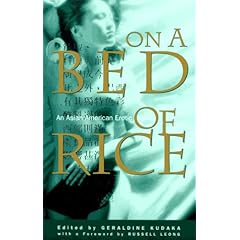Photo by KAZU NISHIO.
Violinist YUMI MIYAGISHIMA and Poet YURI KAGEYAMA at What The Dickens in Tokyo, SUN Sept. 7, 2008.
The poem is part of the program at “TALKING TAIKO,” an evening of multicultural poetry and music with master percussionist WINCHESTER NII TETE at BUNGA 6:30 p.m. SUN Sept. 28.
TO AN EX-LOVER
First published in Oakland Tribune; one of the poems in “Peeling,” by Yuri Kageyama.
You could only sleep, turned away. EVERY NIGHT, HIS BICEPS PILLOW MY HEAD.
You told me that she was a hard act to follow, being the daughter of your parents’ friends. Before your parents came over, you hid my things in the closet.
My friends were too strange, you used to complain. That I stayed up till six in the morning, while you slept, and slept, while you worked, and was never hungry the same time you were. WHEREAS, AFTER NIGHT-LONG DISCUSSIONS, HE TAKES ME FOR DAWN-LIT SNEAKERED STROLLS ALONG THE BEACH.
I let dust collect on the kitchen table, left things here and there, like animal droppings, cluttering your cleanliness.
You felt sorry for me. You paid my bills, got me health insurance, provided me with gas cards and made me laugh with John Wayne imitations. Because I always sat pensive, with a sad distressed lonely look. Even now, you tell me I’m a zombie. HE LAUGHS THAT I’M ALMOST AS CRAZY AS HE IS HIMSELF.
You’d watched how your older brothers had hurt your parents, by becoming a musician, trying dope, dating Chinese, so you’d vowed to a way of spineless kindness, obsessed with moderation, avoiding conflict till you’d, at times, crunch onto the floor, holding in the tumor of self-denial within your brain.
WE WALK TOGETHER, GIGGLING IN J-TOWN, ARM IN ARM, BECAUSE THE “COMMUNITY” IS SO LUDICROUS SOMETIMES. While you told me, never to mention your name in J-town again. For, deserted in insecurity, I used to sit, gulping down bourbon bitterness, telling the blues, how I loved you and you didn’t love me.
You loved me by fixing the car. You loved me by criticizing how I didn’t dress San Francisco. You loved me by watching “Starsky and Hutch,” sipping soda, after an eight-to-three-thirty school-teaching day. You loved me by telling me I could do whatever I wanted; you had no right to restrict my freedom. So I went discoing, while you visited your parents for the weekend. HE WANTS TO BE WITH ME. HE JUST TELLS ME, “DON’T FUCK AROUND.”
I still don’t smoke in front of you.
After I moved out and out of your life, you bought me sweetheart roses that never opened in the water. HE SURPRISES ME WITH AN ORCHID CORSAGE THAT BLOSSOMS WHITE-PURPLE WITH THE PRIDE IN THE LOVE WE FEEL.
You played the trumpet alone in the attic.
When I touched you, my fingers drained your energy. HE KISSES ME ON THE MUNI BUS.
You didn’t know why I cried when you stated matter-of-factly, it took no talent to write poetry. You grin cynically over coffee at a shopping center, that now you never want a woman who’s into art. You keep on telling me that you’ve seen the light; you want to get married within a year, and you’re searching hard.
You faithfully attended family gatherings for Mother’s Day, Father’s Day, Thanksgiving, Christmas, New Year’s, Easter, piano and dance recitals, countless birthdays, and brought back roast turkey, potato salad, sushi and cake.
WE GO LISTEN TO JULIAN PRIESTER OR KEHVAN-LENNON-ONAJE, SEE ZATOICHI AND ITALIAN FILMS, DANCE TO VIVA BRAZIL ON LOMBARD STREET OR CHAKA KHAN IN THE DIMNESS OF HIS ROOM.
You said you loved me because I cooked relatively well and I had sweet mannerisms. I DON’T BOTHER ASKING FOR HIS REASONS.
You explained to me that I was not the type of woman you wanted for a wife. We were incompatible, despite our two years together. When you finally proposed, with tickets to Hawaii _ you realized that to take this plaything out of its glass case on the mantle, at your own leisure, could add excitement to your life _ when you finally declared your love, I had aborted mine long ago. HE SMILES TO ME, LET’S GET MARRIED TOMORROW; I REPLY, OKAY, LET’S.
HE THANKS ME FOR MY LOVE, FOR BEING AROUND.
HE NEVER TURNS AWAY, EVEN IN HIS SLEEP.
